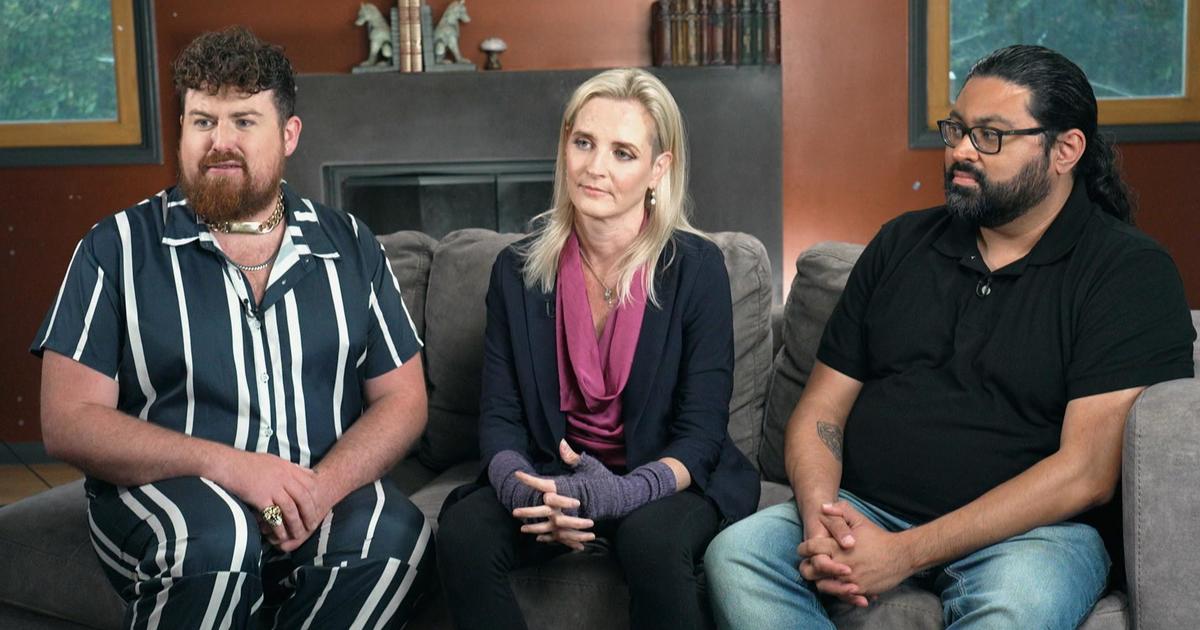Each year, the number of Americans who are leaving organized religion continues to grow. According to 2024 Pew Research Study, more than 1 in 4 Americans now identity as religious “nones,” meaning they are not part of a religion. But at the same time, many are looking for the community that religion often provides.
The CBS Mornings series, “The State of Spirituality with Lisa Ling,” explores unique paths to faith, spirituality and religion in the U.S. The latest installment of the series focuses on an often overlooked but key part of this conversation: non-believers.
At first impression, a Sunday Assembly service appears to look like a typical contemporary church service, but there is a clear difference. At Sunday Assembly, there is no religion. Instead, it is a secular gathering where most are atheist.
Ryan Trout, Amy Boyle and Sam Renderos are all leaders within Sunday Assembly Los Angeles.
Trout said for him, Sunday Assembly means community.
“Sunday Assembly is family to me,” Boyle added.
“I would always have conversations with other friends who are atheist … we never had community and when I discovered Sunday Assembly, I found that community,” Renderos said.
According to Pew Research, nearly 30% of U.S. adults are now religiously unaffiliated. That means they often define themselves as atheist or agnostic. Atheist is usually described as someone who does not believe in God, and agnostic is often described as one who is unsure if there is a God.
“I reject most supernatural, if not all supernatural ideas,” Renderos explained. “But what I have need for is community and human connection, the stuff that to me matters most.”
Renderos said that community is being formed at Sunday Assembly. It’s an unconventional gathering, but it employs a very conventional church-like structure.
“We have a Ted Talk-style talk,” Boyle explained. “We do sing alongs. Tell a personal story. This might be sounding familiar because it has a lot of the same components that a church might, but we don’t do religion.”
How Sunday Assembly began
Sunday Assembly was founded in 2013 by two comedians in the U.K. It now has around 60 chapters all over the world, including in other U.S. cities like Atlanta, Chapel Hill and Nashville.
Boyle explained that while they don’t practice religion, there is a science behind why it feels good to gather with others and sing together.
“We release a lot of endorphins,” she said. “It helps unite people … the ingredients of a church service are powerful.”
But the members also acknowledge their church-like structure may not be for everyone. According to a 2023 study published in the Socio-Historical Examination of Religion and Ministry Journal (SHERM), 1 in 3 Americans report they suffer from some form of religious trauma.
“Religion has harmed a lot of people,” Boyle said.
Trout added, “We have people that find it triggering, the actual assembly that happens once a month, but still come to our game nights and comes to our book clubs…and they’re no less a member of the community than the people that come every month to the Sunday Assembly.”
Despite most members being atheist, all are welcome at Sunday Assembly, even those with faith, which includes Trout. He said he identifies as an “agnostic Episcopalian.”
Raised Baptist in Kentucky, Trout left the religion, he said, because of its exclusion of women and the LGBTQ+ community.
“I like the organized part of it, a lot of people run from organized religion, but the organized part of it was such a sell point for me,” he explained.
While Trout began identifying as agnostic, he was also called to the ancient rituals found in the Episcopal Church. Now, he’s trying to bring similar rituals to Sunday Assembly.
“We’re working on a book of…secular traditions and rituals that we can pass on to people because I think it’s important. It’s historic,” he said. “You feel part of something bigger than yourself.”
What spirituality provides
Varun Soni, the dean of religious life at the University of Southern California, said spirituality helps give people meaning and that can be found in religious and secular spaces.
“What does my life mean? What matters to me? Why does it matter to me? Those are questions we all ask whether we’re religious or not, ” he explained. “Those are spiritual questions.”
Soni said atheists and humanists in the United States are often religiously literate and have done their research.
“Atheists, humanists, agnostics, I know many of them have deeply spiritual lives,” he said. “And in fact, they’re animated by the idea that as humans, we can do great work in the world.”
That very idea is part of the Sunday Assembly motto: “Live better, help often and wonder more.”
The Sunday Assembly members said they don’t need religion to tell them to do or be good.
“We have empathy. We have a moral compass,” Boyle said. “But when it comes down to like where does morality come from … it comes from ourselves and our connections to each other.”
Renderos added, “This is the one life we have, so we should celebrate it with each other for all the time that we get.”

